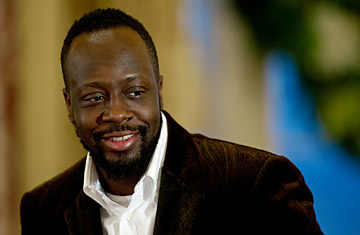
Wyclef Jean
On the streets of Port-au-Prince, there's no missing Wyclef Jean. The hip-hop superstar's face is plastered on billboards advertising the cell-phone company Voila, and local radio stations constantly play the recent remake of "We are the World," which features Jean singing in Haitian Creole as the literal voice of his island nation. He may, however, want to do more than just symbolize Haiti.
This week saw a strengthening of the rumors swirling over the artist's possible run for President of Haiti in November. Jean, 37, has done little to quell the speculation. And on Wednesday night, he met with politically connected fellow Haitian artists until 1 a.m. at a popular restaurant in the Port-au-Prince suburb of Pétionville. Asked by TIME about his ambitions, Jean said only that there was a "possibility" that he would run for President, but it would only be official once he declared it to the Haitian government. "I've been wearing the Haitian flag on my back since 'No Woman, No Cry,' " he said, referring to his remake of the Bob Marley song. "If I do run, it will always be through legal channels." The deadline for filing candidacy is Aug. 7.
In the age-old tradition of political coyness, Jean compares himself to another musician turned leader: David of Israel, who was once a harpist at the royal court, before he became his country's king. But Jean's close friend and Haitian political insider Eric "Tonty" Jean-Jacques is more direct. He says the co-founder of the Fugees meets all the constitutional requirements and will be declaring his run for President next week.
Jean-Jacques adds that Wyclef will be running as a member of the one-year-old political party Ensemble Nous Faut. "We made a decision to put him in front as a representative of a new Haiti," says Jean-Jacques. "We don't want the Haiti of the past." Jean-Jacques, who was present at the closed-door restaurant meeting on Wednesday night, is a member of Ensemble Nous Fat, with his own ambitions to run for office in Pétionville.
The reference to constitutional requirements raises a potentially vexing issue. To be qualified to run for the presidency, Jean must prove that he has resided in Haiti for five consecutive years, owns property in the country and has never been a citizen of any country other than Haiti. Jean-Jacques says those rules are open to interpretation, pointing out that no time frame for the residency is specified, thus Jean — who was born in Haiti, left at age 9 and was raised in New York City — can run for President. "If we get too caught up in these details, it will be a great sorrow for this country," Jean-Jacques says.
Jean-Jacques says the musician has already met with prominent Haitians in an effort to muster support, adding that the political campaign will have the slogan "Face á face" (Face to face) to foster dialogue. It will also feature musical events to encourage the participation of the young. (About half of Haiti's population is between the ages of 15 and 29.) There will be 700,000 pamphlets distributed countrywide with Jean's political agenda in French, Haitian Creole and English.
Jean-Jacques says Wyclef's platform will focus heavily on ways to increase employment, and among his first orders of business as President will be to allow dual nationality as well as to revise archaic land-ownership laws, which have impeded the ability of NGOs to construct transitional and permanent housing for 1.5 million homeless Haitians.
The popular reception to a Wyclef Jean candidacy appears mixed. On a street corner, a group of young men pose on their motorcycles as they idle the hours away. Before the earthquake, 50% of the country's youth were unemployed, and the story hasn't changed for these men. The self-proclaimed king of this corner, Sydney Meristal, 23, says this will be the first election he will vote in, and that's because of Jean. "Wyclef loves Haiti. He has ideas for Haiti," says Meristal. "If Wyclef decides to run, he'll win."
But another young man, Steve Burr-Renauld, 23, says he would not vote for Jean because he doesn't have the credentials to run the poorest country in the western hemisphere. "What if [rapper] Jay-Z became President of the United States? That would never happen," says Burr-Renauld. "We already took a bullet in the knee after the earthquake. If Wyclef were President, we would be taking a bullet to the head."
In Pétionville, Millise Vylis, 39, says she wouldn't vote for Jean because she's not voting at all. She says she voted for former President Jean-Bertrand Aristide and current President René Préval but that there has been little progress. "You made so many sacrifices, the blood of your children flooded the streets, and then you see the country's gotten worse," says Vylis. "I would only vote if they paid me."
Elsewhere in the capital, Mario Brutus, 52, a political-campaign organizer, says the musician would certainly make political noise. But he foresees language being Jean's greatest barrier. "He doesn't speak Creole or French," says Brutus. "To be President of Haiti, you have to be able to speak the language of the country." Those close to Jean admit that he speaks Haitian Creole with a heavy tongue.
Jean-Jacques says Jean is taking lessons in both French and Haitian Creole to improve his communication skills with the Haitian population. And when TIME asked if he had a Haitian passport, Jean jokingly said, "No, I have a passport Haitien" in emphatic Haitian Creole.
